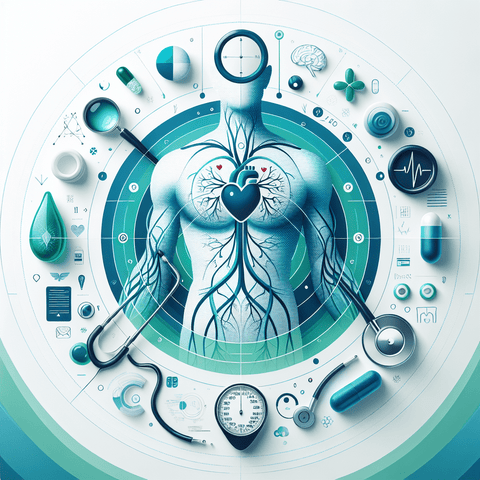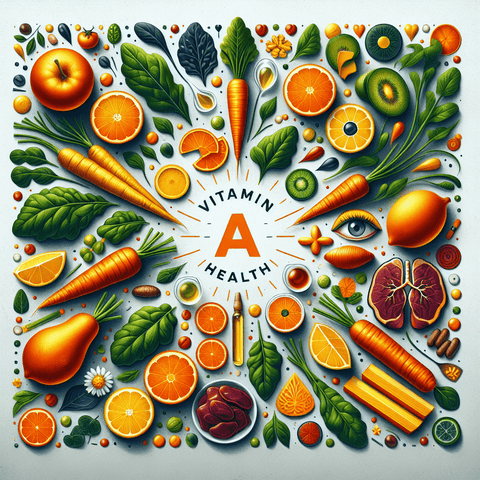Understanding B12 and Blood Pressure: What Role Does It Play in Nutritional Supplements?
Vitamin B12, scientifically known as cobalamin, is a water-soluble vitamin essential for many core bodily functions, including red blood cell formation, neurological functioning, and DNA synthesis. Naturally found in animal-derived foods such as meat, eggs, dairy, and shellfish, its significance in nutrition has been widely studied, especially in the context of energy metabolism and neurological integrity. Blood pressure regulation, on the other hand, is a tightly controlled physiological process influenced by multiple factors like vascular function, kidney activity, hormonal responses, and nutritional status. Given the prevalence of hypertension worldwide—affecting nearly 1 in 3 adults—it’s not surprising that many people are curious about the role of dietary supplements like vitamin B12 in either contributing to or managing elevated blood pressure. The idea that B12 might influence blood pressure stems from its connection to homocysteine, a naturally occurring amino acid in the blood. Elevated homocysteine levels are often seen in people with low B12, and high levels may correlate with an increased risk of cardiovascular issues including hypertension. This raises the important question: can supplementing with B12 moderate blood pressure or perhaps even inadvertently contribute to elevating it? People who consume dietary supplements often do so to optimize their health without fully understanding how each nutrient interacts with their cardiovascular systems. For example, nutrients like vitamin D and magnesium are often praised for their beneficial roles in cardiovascular health and are available in specialized collections such as the vitamin D supplements or magnesium collections at Topvitamine.com. But where does B12 fit in? Since B12 is essential not only to neurological and cellular processes but also to metabolic pathways affecting cardiovascular stability, understanding its role in blood pressure regulation is crucial. This article explores the scientific consensus on how B12 may influence blood pressure, particularly looking at clinical evidence, proposed biological pathways, and practical implications for people considering B12 supplementation.Vitamin B12 Hypertension: Can This Essential Vitamin Influence High Blood Pressure?
Researchers have long sought to clarify whether a link exists between vitamin B12 levels and the risk of developing hypertension. Several observational and interventional studies have attempted to draw correlations between B12 concentration in the blood and blood pressure values. One proposed mechanism is the vitamin's role in homocysteine metabolism. B12, together with folate and vitamin B6, influences homocysteine levels through methylation processes. High homocysteine is considered a risk factor for cardiovascular diseases, including hypertension, partly due to its damaging effects on the endothelium—the inner lining of blood vessels. Damaged endothelium impairs vasodilation, potentially increasing vascular resistance and leading to elevated blood pressure. Some scientific studies—particularly those evaluating populations with a known deficiency in B vitamins—have shown that supplementing B12 can lower homocysteine levels, possibly leading to improved vascular function. As such, in patients with both hypertension and diagnosed B12 deficiency, supplementation might indirectly contribute to better blood pressure control. On the other hand, studies demonstrated conflicting outcomes. A large population-based cohort study found no direct correlation between high B12 levels and decreased hypertension risks. Instead, results showed that those with adequate B12 levels still presented high blood pressure if other lifestyle and genetic factors were at play. Therefore, B12 alone doesn’t appear to be a silver bullet for preventing or treating hypertension outright. Additionally, vitamin B12 deficiency—often unnoticed due to its subtler symptoms—has been associated with neuropathy affecting the autonomic nervous system, which controls blood pressure regulation. Autonomic dysfunction can cause unstable or elevated blood pressure readings, suggesting another potential indirect path through which B12 might influence hypertension. In summary, the presence of low B12 may contribute to factors that worsen or destabilize blood pressure, particularly through elevated homocysteine and poor vascular health. However, sufficient empirical data is lacking to conclusively state that B12 itself, when supplemented at proper levels, causes significant changes in blood pressure for the average individual.B12 Supplementation Blood Pressure: Does Taking B12 Supplements Impact Your Blood Pressure Readings?
B12 supplementation is common, especially among older adults, vegetarians, vegans, and individuals with autoimmune gastrointestinal disorders like pernicious anemia or Crohn's disease. The forms of B12 commonly used include cyanocobalamin, methylcobalamin, and hydroxocobalamin, available in pills, sublingual tabs, or injectable formats. Clinical trials investigating B12 supplementation and its effects on blood pressure are still limited but growing. In interventional studies where blood pressure was measured before and after B12 administration, results varied depending on the population studied. Some trials showed a moderate reduction in systolic blood pressure among participants with originally high homocysteine when B12 was administered alongside folate and B6. However, as an isolated nutrient, B12’s effects on blood pressure were often negligible. Exceptions exist in populations where B12 deficiencies are linked to hypotension or dysautonomia. In those cases, correcting B12 deficiency helped stabilize blood pressure rather than directly lowering it. Other trials pointed to improved heart rate variability and autonomic balance after B12 treatment, suggesting it may benefit cardiovascular regulation in subtle ways over time. Dosage and duration also play crucial roles in these outcomes. Most over-the-counter supplements offer between 500 mcg to 2000 mcg of B12 per serving—amounts vastly exceeding the Recommended Dietary Allowance (RDA) of 2.4 mcg per day. Fortunately, excess B12 is typically excreted through urine due to its water-soluble nature, making toxicity rare. That said, monitoring is essential for individuals with kidney disease or underlying cardiovascular issues—particularly if they’re combining supplements such as B12 and other vitamins like those in the vitamin K category, which can influence vascular and blood health. When used responsibly, B12 supplementation should not raise blood pressure in healthy individuals. However, those already managing hypertension or on medications should consult a healthcare provider before adding high-dose B12 to their regimen.B12 Effects on Hypertension: What Does Science Say About Vitamin B12 and High Blood Pressure?
To understand how B12 might interact with hypertension mechanisms, researchers have explored the biophysical influence of this vitamin at a cellular level—particularly in mitochondrial energy production, nitric oxide synthesis, and homocysteine metabolism. Nitric oxide, a vasodilator, plays a critical role in maintaining vascular tone and reducing blood pressure. While B12 doesn’t directly increase nitric oxide production, it supports cellular pathways that maintain endothelial health, indirectly facilitating nitric oxide bioavailability. A decline in these functions, often observed in B12-deficient individuals, could theoretically compromise endothelial responsiveness, making blood vessels less able to relax and accommodate blood flow. Homocysteine reduction remains the most researched pathway through which B12 might impact hypertension. Elevated homocysteine can lead to oxidative stress, inflammation, and endothelial dysfunction, which are precursors to arterial stiffness and high blood pressure. Several randomized controlled trials have shown that B12, especially in combination with folic acid, significantly reduces homocysteine levels—although whether this leads to meaningful reductions in blood pressure remains debated. It's important to note that while some animal studies show promising cardiovascular improvements with B12 supplementation, translating those findings into human clinical benefit has proven challenging. Individual variability, differing baseline nutrient statuses, and additional lifestyle factors all affect outcomes, making it difficult to attribute blood pressure changes solely to B12 supplementation. For people already supplementing for cardiovascular health purposes, combining B12 with other heart-friendly nutrients like DHA and EPA, found in omega-3 supplements, may provide a more holistic benefit. While B12 supports homocysteine regulation, omega-3s help reduce inflammation and improve lipid profiles, potentially delivering improved blood pressure control when combined. Ultimately, current scientific opinion holds that B12 may aid in promoting cardiovascular stability through vascular health but doesn’t independently lower high blood pressure in a clinically significant way.Vitamin B12 and Systolic Pressure: Does B12 Elevate or Lower the Top Number in Blood Pressure?
The systolic blood pressure—the top number in a blood pressure reading—represents the pressure in arteries when the heart beats. It’s an essential marker of cardiovascular health and a principal concern for hypertensive patients. Several studies have attempted to establish B12's influence on systolic pressure. Results are again mixed. In populations where B12 deficiency was prevalent, supplementation often resulted in modest reductions in systolic numbers. These effects are largely attributed to reduced homocysteine levels and better endothelial function, as B12 helps repair oxidative damage in blood vessels. In elderly patients, particularly those with existing comorbidities and reduced B12 absorption, introducing a supplement improved not only cognitive clarity but was found to aid autonomic functions—factors crucial in regulating systolic response variability. Some trials link improved B12 status with reduced arterial stiffness, leading to more adaptable and resilient blood vessel response, thus positively influencing systolic pressure. Yet the effect of B12 on systolic pressure appears to vary significantly by cohort. For example, in younger participants with no clear deficiency or clinical symptoms, no significant change in systolic pressure was noted after high-dose B12 administration. This underlines the idea that B12’s benefits are most salient in cases of functional or clinical deficits. The takeaway: B12 might help in reducing elevated systolic pressures in people with deficiencies or compromised vascular function, but it is not a substitute for antihypertensive medications or lifestyle modifications. Those with concerns about their top number—especially higher-risk individuals—should seek clinical advice and monitor changes closely when introducing B12.B12 Deficiency and Hypertension: Is There a Connection Between Low B12 Levels and Elevated Blood Pressure?
Vitamin B12 deficiency is more common than many realize, particularly in vegetarians, vegans, the elderly, and individuals with gastrointestinal malabsorption disorders. It has been postulated that low B12 levels may contribute to the risk of hypertension through multiple pathways. A prolonged B12 deficiency can result in elevated homocysteine concentrations, leading to endothelial damage and higher arterial resistance. This, in turn, can increase both systolic and diastolic pressures. Patients with long-term deficiency might also suffer autonomic dysfunction due to impaired nerve function, affecting the body’s natural ability to regulate blood pressure. Global data shows that in regions with poor diet diversity, B12 deficiency rates can exceed 30%, and a corresponding association with cardiovascular issues including hypertension has been observed. In these cases, correcting B12 levels often coincides with a reduction in blood pressure—and a few small studies have shown this, particularly among older adults. For hypertensive individuals, especially those not responding well to conventional treatment, screening for B12 deficiency may offer clues into underlying contributing factors. Measuring B12, folate, and homocysteine levels helps better evaluate the need for supplementation as part of a comprehensive management plan. Given the oxidative stress and inflammatory cascade associated with low B12, even mildly deficient individuals may benefit from nutritional supplementation. This is especially relevant in conjunction with other supplements involved in cardiovascular wellness—such as those in the vitamin C collection, which also support immune system function and antioxidant protection. Correcting B12 deficiency could be a small but important piece in the mosaic of cardiovascular care, potentially helping achieve better blood pressure control in the right patient population.Conclusion: Does B12 Raise Blood Pressure? Summarizing the Evidence and Recommendations
After a thorough review of available scientific research and clinical insight, we can conclude the following: Vitamin B12, in and of itself, does not directly raise blood pressure. Rather, it supports several metabolic and cardiovascular functions, particularly homocysteine regulation and vascular integrity. In cases where B12 levels are insufficient or deficient, supplementation may contribute to more stable or reduced blood pressure—specifically systolic—due to enhanced endothelial function and improved autonomic responsiveness. However, B12 supplementation is not a substitute for prescribed antihypertensive therapies. Additionally, in people with normal B12 levels and no cardiovascular concerns, adding high-dose B12 is unlikely to significantly alter blood pressure readings. For those considering B12 as part of their supplement regimen, it is essential to consult with healthcare professionals, especially when addressing cardiovascular health. Careful monitoring, functional testing, and personalized dosage plans are important for safe and effective supplementation. The future of B12 research lies in exploring its synergistic effects with other nutrients, determining optimal dosage for vascular health, and understanding its role in age-related blood pressure changes.Q&A Section
Q: Can B12 supplements cause high blood pressure?A: There is no strong scientific evidence to suggest that B12 supplementation causes high blood pressure. In fact, in people with low B12 levels, supplementation can sometimes lead to a modest reduction in blood pressure. Q: Does B12 help lower blood pressure?
A: B12 may help lower blood pressure in those who are deficient by reducing homocysteine levels and improving vascular function. However, its effect is usually modest and indirect. Q: What’s the safest way to supplement with B12 for heart health?
A: The safest way is to use age- and condition-appropriate dosages as recommended by a healthcare provider. Monitoring is key, especially when combining B12 with other cardiovascular-supportive nutrients such as those found in vitamin K or omega-3 supplements. Q: Should people with hypertension test their B12 levels?
A: Testing B12 levels can be beneficial, particularly in older adults, vegetarians, or those with GI disorders. Identifying a deficiency allows for proper supplementation, which may help in long-term blood pressure management. Q: Is B12 safe to combine with other heart-related supplements?
A: Yes, when done responsibly. Combining B12 with nutrients like magnesium and omega-3 fatty acids can support cardiovascular health. You can explore such products in the magnesium and omega-3 categories at Topvitamine.com.



